Legend tells us
the MTV blasted off on television on August 1, 1981 with the Buggles’
“Video Killed the Radio Star” – a song that was like a shot off the
bow of the staid music world and became the channel’s own personal
mission statement. However, while that was true, that is only part
of the story. It turns out that there was a certain amount of
agita within the channel about playing a song that was already
two years old and hadn’t been much of a hit when it was out. Part
of the choice for that song was symbolic, but part of it was through
necessity. At the time, the 24-hour channel had a little over 150
videos – and about 30 of those were by Rod Stewart. Therefore, that
day the channel also showed such unlikely MTV artists as obscure
British rockers Ph.D and jazz guitarist Lee Ritenour.
This is just the
kind of juicy little tidbit you can pick up in I Want My MTV: The
Uncensored Story of the Music Video Revolution (Dutton),
an oral history on the formative years (1981-1992) of the legendary
cable channel. Put together by rock journalists Craig Marks and Rob
Tannenbaum, who spoke with over 400 execs, VJs, music stars and
video directors to give an unparalleled view at the rocking days and
wild nights of the fledgling music channel.
We recently sat
down with co-writer Craig Marks to get the skinny on the skinny tie
brigade who made us demand “I want my MTV” for more than a decade.
What made you and
Rob want to write a history of MTV?
We both grew up
watching MTV in that era. This is also the 30th Anniversary this
year of MTV’s launch, so it was somewhat tied to that. Just from
talking to people, we thought there was a lot of fondness for the
music video as a form. A history of that, coupled with a history of
MTV, hadn’t really been explored before.
 You spoke with
over 400 artists, execs, etc on the book. Who were some of the most
helpful in making the book?
You spoke with
over 400 artists, execs, etc on the book. Who were some of the most
helpful in making the book?
They were all
helpful in their way. Obviously, it was really important that we
were able to talk to the founders of MTV. So, I would say Bob
Pittman, John Lack, John Sykes, Les Garland and Fred Seibert – on a
creative perspective, they’re really the five most important
people. Without any of whom, probably MTV wouldn’t have succeeded
the way it did. That was paramount. Then, as far as artists go,
now you’re talking about pretty much every artist who ever made a
music video, or one of note. It was crucial that we talk to
Duran Duran
and they were great interviews. A lot of the directors were really
vital, people like Russell Mulcahy and Steve Barron for instance,
and Wayne Isham. Back in those days, these directors made videos
like one a month. It was like assembly line style. There are so
many videos these guys made that to me, and I think to our
readership, are very memorable. It was invaluable to have their
recollections and have their insights into those… and just their
great stories. What it was like being on the front line of this
video revolution. They were really the people best equipped to tell
the stories.
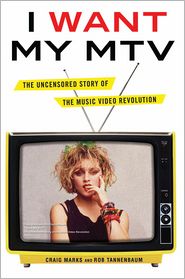 Who were some
people you would have loved to talk to, but just couldn’t get?
Like, obviously Michael Jackson…
Who were some
people you would have loved to talk to, but just couldn’t get?
Like, obviously Michael Jackson…
Yes, Michael
Jackson was unavailable. You know, there are artists who for one
reason or another declined to talk to us for the book, but I feel
like we talked to enough of the people that surrounded them – either
from the labels, or the producers, the directors, the extras in the
videos – that we got a pretty good sense of what it was like on the
sets of those videos. And what it was like to be that artist at
that point. I mean, Madonna is not interviewed, but I feel like you
can read this book and not really realize that she is not
interviewed, because there was such a good feel for how important
she was. I would have loved to have talked to David Lee Roth. I
think he is probably the figure that Rob, my co-writer, and I most
were hoping to talk to, because he is such a colorful guy. Also,
having interviewed him in the past for different magazines, we knew
he was a really great interview. He was the person that we
felt saddest about not talking to. From the directors perspective,
schedules didn’t permit, but I would have loved to have talked to
David Fincher.
How did you feel
doing it as an oral history makes the story more immediate?
It’s less
filtered, I’d say. For better or for worse, the authorial point of
view is… while we obviously still have a guiding hand and had to
shape the stories, the tales are being told by the people who were
the eyewitnesses to it. The kind of people we interviewed are
nothing if not really good storytellers. The era that we are
writing about did nothing if not provoke lots of good stories. The
1980s are a fun time to write about. So it felt like an ideal
vehicle for an oral history. To get multiple perspectives on
certain videos, certain memorable times at MTV, certain turning
points for the network. If we had written in as a more traditional
narrative, right through, it probably wouldn’t have been quite as
punchy. Maybe some of the fun would have been backgrounded for some
more cultural context. That would have just been a different book –
not necessarily better or worse, but I’m glad we chose the route
that we did. There were certain books, like the Saturday Night
Live oral history or Please Kill Me! that paved the way
for this kind of book. We were able to use those as kind of PPS
guides of how we wanted this to turn out.
It was kind of
amazing reading about some of the business practices at MTV at the
time – the massive amounts of drugs and sex and the crazy hours. In
a modern world where HR is up your ass if you brush up against
someone or steal a stapler, do you think that could ever happen
again?
Probably,
although I don’t think in the music business, essentially because of
the profit… they’re just not making enough money to behave so
badly. (laughs) The only reason that you can get away from
that kind of stuff is if you are making so much money where you seem
that it’s got enough forward momentum that bad behavior can be
tolerated. Also, it was a drug-fueled era. Cocaine was the drug of
choice. That prompts a certain kind of behavior – a kind of
reckless behavior, I guess. The people with MTV, to their credit,
it was their relationships with artists and the executives that
worked for the record companies that enabled them to convince
artists to do things that now would be unheard of. For Mick Jagger
and David Bowie to film commercials for free for the network – which
they did with the “I Want My MTV!” campaign – that was for different
reasons, but one of the main reasons was the people at MTV were
buddies with those artists. So a certain level of schmoozing of the
artists was endemic to the job. That requires some social
lubrication usually, in the form of tequila shots or late nights.
That was part of their gig. That’s what made them really good at
their job. They would party until 3:00 and they would be in the
office at 9:00.
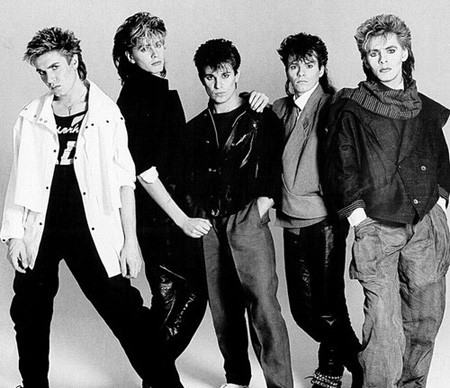 It was funny, for
such a young medium, music videos quickly came up with a whole set
of visual clichés: the falling wine glasses, the singer’s face
projected on walls, dripping water, dwarves… Name some of your
favorite music video clichés.
It was funny, for
such a young medium, music videos quickly came up with a whole set
of visual clichés: the falling wine glasses, the singer’s face
projected on walls, dripping water, dwarves… Name some of your
favorite music video clichés.
The falling wine
glasses – that was Russell Mulcahy’s specialty. He invented that.
There was a Motels video, and then the Duran Duran video. The overturned
table was a really good stock image. That one I like. Also, I lost
count of the number of videos that featured stacks and stacks of
televisions. That was really popular – kind of a post-modern
comment on the visual world, or something. That was a really big
one that I remember.
It’s sort of like
shooting fish in a barrel to come up with bad music videos from the
early days of MTV, but name some that have actually stood up pretty
well artistically?
I think there’s a
lot. From the very early days, the English New Wave bands of late
‘81/’82: Duran Duran, Culture Club, Human League, ABC. I think the ABC
videos are really great. Julien Temple did a couple of those. The
Duran Duran videos, the exotic trilogy of “Save a Prayer,” “Rio” and
“Hungry Like the Wolf,” those are still spectacular. I think Human
League’s “Don’t You Want Me?” is a really fantastic video. That was
Steve Barron, who had been watching a lot of Truffaut. Usually that
kind of pretention didn’t pay off, but in that case it really did.
Those groups were more creative visually than a lot of the hair
metal bands that followed them. Those videos adhered to a pretty
strict template – they were performance videos with a little bit… I
think, even though it became clichéd so quickly, Motley Crue’s “Home
Sweet Home,” which was stock full of slow-motion shots of forlorn
bands being on the road. That then became Bon Jovi’s “Wanted: Dead
or Alive” and so many other videos where it was like: Boo hoo, the
life of the road is so exhausting and yet fun with slow-motion
shots. Those are still pretty fun to watch.
That said, what
were some of the videos that now just look awful and completely
dated?
There are so
many. I think the band that had the hardest time making the
transition were the American rock groups of the ‘70s. Famously,
Journey’s “Separate Ways” is preposterous – an awful video. Also
the Journey “Faithfully” video, which isn’t quite as bad, but it is
a ballad and it’s got lots of slow-motion shots of them on the road
and has one really fantastically awful shot of Steve Perry shaving
his mustache, which you can’t imagine why it’s in a music video.
Those Hall and Oates videos are terrible, really. And they are the
first to admit that these videos are just wretched. You can really
see it’s the groups that didn’t like making videos – that felt it
was beneath them – those were the videos that failed the most.
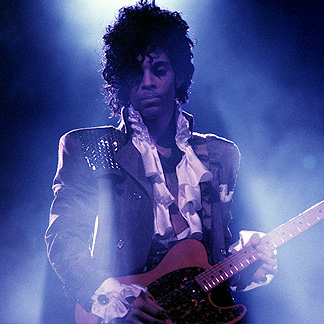 I remember a lot
of the even pre-MTV videos – like for example “Crackerbox Palace” or
“Solsbury Hill” – they are hard to watch.
I remember a lot
of the even pre-MTV videos – like for example “Crackerbox Palace” or
“Solsbury Hill” – they are hard to watch.
There are
technical things. Until CGI came to the fore, attempts to make
those types of special effects videos were pretty ham-fisted. I’ll
tell you someone who made terrible videos was Prince. Prince’s
videos are shockingly bad, because he was such a megalomaniac that
he wouldn’t let anybody else direct them. There are stories in the
book where he would hire directors, because someone felt that they
had to, and Prince’s manager would say, “Okay, why don’t you wait
out here and read a magazine while we make the video.” Luckily he’s
just such an absorbing live performer that the videos seemed kind of
exciting. But given his stature as an artist, if you compare them
to the Michael Jackson videos or the Madonna videos, they were
really cruddy.
There was the
famous question that was discussed in pretty much detail in the book
– pre-Michael Jackson, was MTV racist? Most of the employees
strongly denied it, saying that it was just their format, but just
as many artists felt it was legit. Having spoken to so many people
on the subject, do you think the charge had any validity?
I don’t think
they were personally racist at all. I think they came from an
institution – commercial radio – where the prevailing wisdom was
built on narrowcasting. You would play a certain narrow band of
music to appeal to a certain demographic that you wanted to
attract. They did not think that their audience, which they thought
was going to be essentially a suburban male audience, was going to
respond well to urban music videos. It’s questionable whether this
is what their research said or this is how they read their research,
but this is what they believed. They had years and years in AOR
radio to back that philosophy up. It took them until Michael
Jackson to realize that this is TV, not radio. Visuals mean more.
The package is more than just the sound of the record – or even the
skin color of the artist. “Billie Jean” was a great video. It was
so much better than everything else that preceded it. Then
“Thriller” was so much better than everything that preceded that.
It was TV, so it had a larger available audience. And Michael
Jackson: lucky for MTV that he was such a charismatic, dynamic,
people-pleasing star that his videos transcended all the
preconceptions that MTV had about audience and music and race. I do
think that MTV was reluctant to play “Billie Jean.” On the other
hand, I know that they were – and this is sort of racial, if not
racist – they were looking for a black artist to play, because the
pressure was on. Luckily Michael Jackson came along. These videos
looked great and he was also an already established superstar. He
was a star with The Jackson Five. He’d already put out Off the
Wall. He sold five million records. This wasn’t like an
unknown dude that they had to roll the dice on. So it was perfect
timing.
You discuss in
the book that MTV sort of killed the idea of a long-term rock star.
Previously, bands could get airplay for decades, like the Stones,
The Who, The Kinks, McCartney, etc. Once the MTV era hit, with the
exception of U2 and maybe Bon Jovi, even the biggest stars’ careers
as hitmakers rarely lasted more than five years or so. Why do you
feel the short attention span of the videos tended to translate to
the length of careers?
I would disagree
with that. I don’t think they killed the idea, I just think they
abetted a different type of stardom, too. Also, if you think about
it, Duran Duran Duran just sold out Madison Square Garden last week.
That’s kind of a long-term success story.
 Yes, they are
still big in touring, but no one buys their current albums and radio
won’t play new songs.
Yes, they are
still big in touring, but no one buys their current albums and radio
won’t play new songs.
And Bon Jovi. If
you think of the MTV acts who were the biggest in the 1980s –
Madonna, Duran Duran, Bon Jovi, Michael, Guns’N’Roses, and then bleeding
into the early ‘90s Pearl Jam, Nirvana – if they are still around,
they are still arena or stadium bands. Van Halen. So, I think that
if you were a star in the MTV era, and you dominated that era, you
had the biggest platform practically in the history of the music
industry. Your stardom is still true in 2011. They were also like
a radio station, so they churned through artists. They churned
through Hammer and Vanilla Ice. They churned through some of the
hair bands. But if MTV wasn’t there, those bands would never have
succeeded as much as they had, so their fall from grace would have
been a less steep one. I don’t think that they created a different
type of temporary-stardom cycle. They just enabled minor stars to
become major stars, in a way that wasn’t available to those minor
stars previously.
One thing I found
kind of fascinating was the quote from Joe Jackson, who at the time
famously came out against music videos, that his stance pretty much
cost him his career. Steve Lukather of Toto also was quite vocal
about how much he hated having to spend his own money to make videos
he knew MTV would never play. Was it really possible in the 80s for
an artist to make it without playing MTV’s game?
Pretty much no.
But, I think it’s for different reasons, too. You take someone like
Joe Jackson – that’s an interesting case study. Elvis Costello and
Joe Jackson, both of them. Costello never made any good videos
really, outside of the very first wave, almost before MTV started.
He just wasn’t comfortable making them. He didn’t seem to like
making them. Joe Jackson essentially refused to make them at a
certain point. What that did more than anything – besides shutting
off one mechanism for getting people your music – was that it
internally at the record companies told a story that maybe this
artist doesn’t really want to be famous. So, maybe we won’t spend
as much money on this artist. If they don’t want to take advantage
of MTV, that says something about this artist, so we’re not going to
spend the money hiring an independent promoter to work the record to
radio. So it had a kind of effect where the machinery behind the
artist started to slow down if the artist either didn’t want to or
couldn’t translate into MTV. Just avoiding MTV in and of itself,
you could still conceivably have a totally fine career. I’m sure
lots of artists did. But most times if you either declined to play
the game or couldn’t figure out how to do it right, it definitely
impacted your sales. It made you seem like you weren’t of the
time. A lot of groups – if you take like, Genesis: they are a
really smart example of a band that made videos work for them, even
though they were completely non-videogenic. So there were ways to
work around it, if you could figure it out. Find the right producer
and director and come up with the right concept. You could have
really great visuals – or really popular visuals – without feeling
like you had to dance and sing like Madonna.
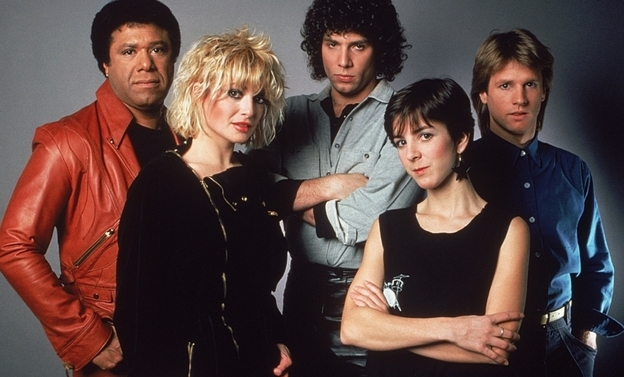 One funny thing
in the book was the fact that the execs of MTV seemed to be the wild
living rock stars, more than the VJs – although it sounds like JJ
Jackson and Martha Quinn had some crazy times. Were you surprised
to find the other VJs were actually kind of mild as compared to say
Bob Pittman or Les Garland?
One funny thing
in the book was the fact that the execs of MTV seemed to be the wild
living rock stars, more than the VJs – although it sounds like JJ
Jackson and Martha Quinn had some crazy times. Were you surprised
to find the other VJs were actually kind of mild as compared to say
Bob Pittman or Les Garland?
It’s sad in many
ways that JJ is not with us anymore. He would have probably told
some great stories. Yeah, I guess so. I guess I was a little
surprised. Goodman was married to Carol Miller during most of his
tenure at MTV. Hunter wasn’t really that much of a party animal.
And Nina was really quiet, too, at least from what everybody says.
Particularly Les Garland exceeded their social animal magnetism by
far. He was by far the biggest rock star of the bunch. But I think
the fact that JJ wasn’t here to share his modelizing stories tilted
the box score a little bit.
It was
interesting that the MTV execs originally created VH1 wanting it to
not necessarily be good – just to undercut Ted Turner but not affect
them. How surprised was everyone when VH1 eventually became a
legit, powerful station as well?
It happened so
much later, well after the book ends in ’92. VH1 floundered for
identity until probably seven or eight years ago.
Yeah, I remember
early on you’d see Air Supply followed by Tony Bennett…
Really, until
they stopped playing music videos and came up with their I Heart
the ‘80s and reality TV programming, that’s when they really
forged an identity. Otherwise, it was just the other video
channel. I found it’s formation was an interesting business story,
as just a way to put Turner out of business. And it was ruthlessly
effective.
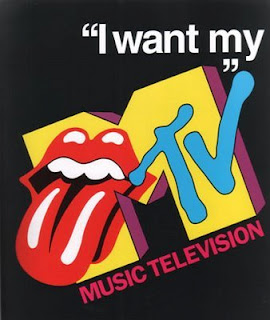 Back in the 90s I
knew a girl who worked for MTV – she wasn’t high up or anything.
But she was about 28 at the time and I remember that she once told
me that working for MTV was sort of like being in Menudo. Unlike
most companies, the longer you had been at MTV and the more
experience you built up, the less power you had. And by the time
you hit 30 you were just about out of there. Do you think that
MTV’s fascination with the youth culture and styles eventually took
the channel from music videos to where it is now –
The Real World,
16 & Pregnant and Jersey Shore?
Back in the 90s I
knew a girl who worked for MTV – she wasn’t high up or anything.
But she was about 28 at the time and I remember that she once told
me that working for MTV was sort of like being in Menudo. Unlike
most companies, the longer you had been at MTV and the more
experience you built up, the less power you had. And by the time
you hit 30 you were just about out of there. Do you think that
MTV’s fascination with the youth culture and styles eventually took
the channel from music videos to where it is now –
The Real World,
16 & Pregnant and Jersey Shore?
Sure. MTV’s
demographic never changes, even though everyone at MTV ages. The
network doesn’t. The network is perpetually fifteen. It
perpetually has to tap into whatever is unique about this
generation’s youth culture, compared to the previous generation’s
youth culture. You need a mix. You need grown-ups running the
ship, but you need essentially kids who know this next generation of
young people and what they are interested in – and how to market to
them. That’s always been the case with MTV and I’m sure it always
will be. Also, I don’t know if it’s true anymore, but back in the
day, MTV paid their staff terribly, outside the top executives. The
directors and producers got nothing. They had a hard time holding
onto their talent, both the Jon Stewarts of the world – who started
on MTV and left pretty quickly – and directors and producers. They
cut their teeth on MTV. They were able to get incredible experience
at a very young age. They were thrown into jobs that were way over
their pay grade, essentially. They got to direct Unplugged
episodes before they really even had their
Directors Guild cards or whatever.
They were working horrendous hours for very little money. The
experience was invaluable, but there is only so long that you can
work that kind of schedule for that kind of money.
I know this was
after the scope of your book, I always felt like the death knell for
music video on MTV was
Total Request
Live – when MTV decided that the fast cuts of music video weren’t
stimulating enough and they had to add lots of bells and whistles to
keep the audience’s attention. When do you feel that the music left
Music Television?
For a few
reasons. Even in 1986, people were saying the novelty of the music
video had worn off. This was 1986, no less 2001. That’s one
thing. In 1986, there were very few other cable networks, still.
Fox… I think… launched in 1987. So even another network going after
a similar demographic… if Fox existed there was just one network
like that. Video games were not as commonplace. The internet
didn’t exist. All the things that young people graft to that are
time-sucks and whose pace is very fast – back in 1985, MTV wasn’t in
competition with any of those things. The music video was a new,
exciting, vibrant, active medium. Come 2001, the music video seems
a little bit tired. It seems old, it seems stodgy in some ways
compared to the other leisure time activities that kids have access
to. That was another part – there were just a lot of really fast
mediums that were competing for their audience’s attention. Also,
MTV realizes essentially as far back as ’87 and really in ’92 when
they launched The Real World that narrative television rated
better for them and therefore enabled them to sell more ads at a
higher price. That’s what it’s all about in TV. You’ve got to sell
your ads. Any TV executive has to do whatever they can to make sure
that people won’t turn the channel. That’s what it’s all about.
You’ve got to get them to watch and you’ve got to make sure they
don’t turn the channel. Their idea was that if you played music
videos too long, kids are going to get bored and turn the channel.
I’m sure they’re probably right. They don’t do those things on a
whim. They do it because they research it and they think it’s
true.
Early on in the
book, the MTV pioneers were being told that a 24-hour music channel
would never work on television. Despite the decade long glory day
of the channel, didn’t MTV eventually prove that point? After all,
when was the last time they actually played music videos?
Yeah, one of the
things I found interesting was when I talked to Bob Pittman, who was
as smart of a person as I’ve ever interviewed in my life. I don’t
know if this is like founder’s hubris or if he has something, but he
still insists that if he had still been there, they would have never
gone into long-form programming. They would have kept at it with
music videos. They would have figured out ways to make the music
videos work. Even as the audience evolved, he thought: We don’t
have to change for advertisers and completely scrap our founding
principals, we can adjust it. We know the audience loves this
medium. But, like I said, once they realized that other things
worked better – narrative television worked better – the first thing
MTV did was starting with a lot of countdown shows. The Dial Ten or
whatever it was called. Then genre things – Yo! MTV Raps or
Headbanger’s Ball. They realized pretty quickly that just
playing random videos sequenced one after the other was too much
like a big, free-formed radio station. It was too easy for people
to turn the channel if they didn’t like the next song. That was
just an unrealistic approach.
Email
us Let us know what you
think.